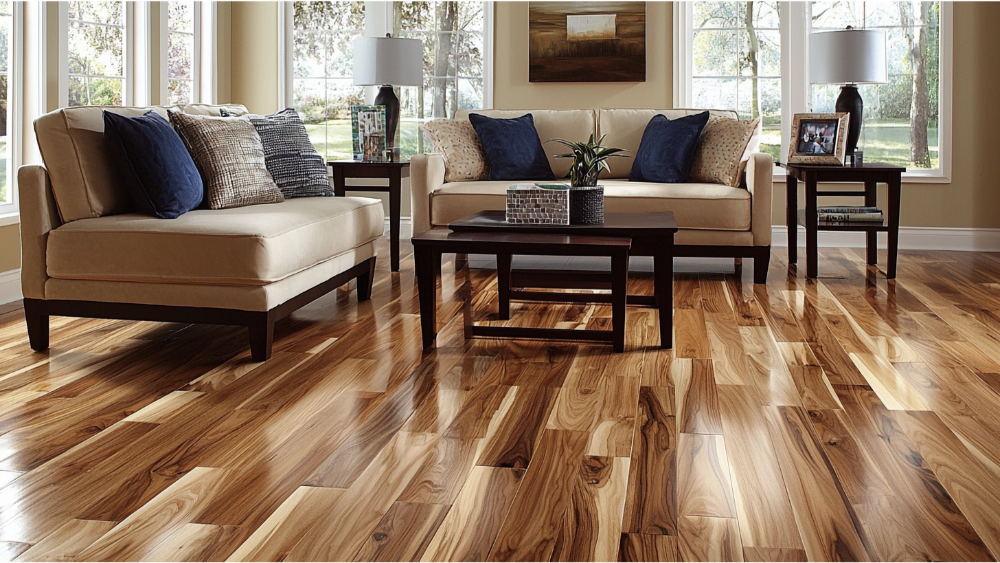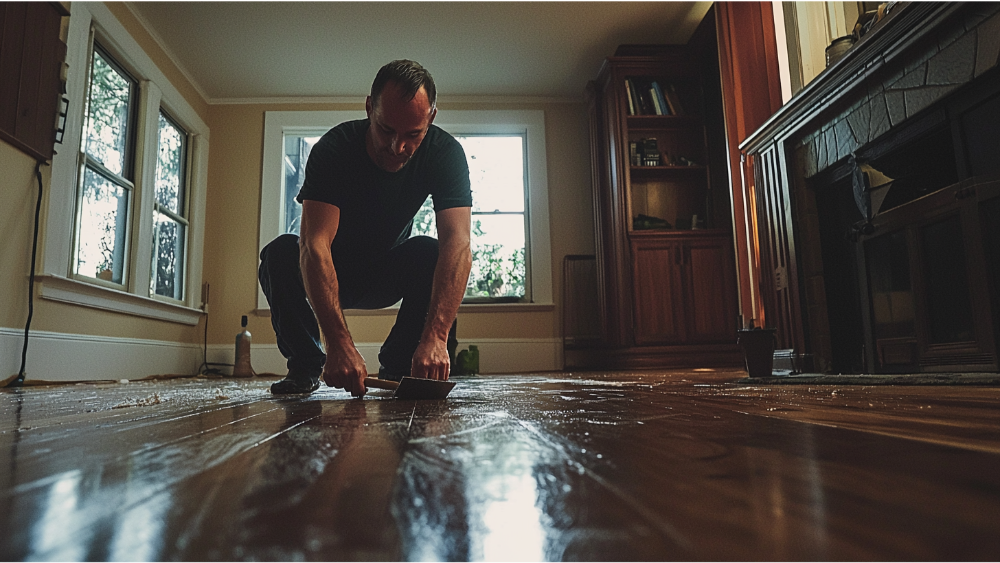Refinishing hardwood floors is a cost-effective way to restore their natural beauty and extend their lifespan. Whether your floors have become dull, scratched, or worn over time, refinishing can make them look as good as new. Understanding the costs involved can help you plan effectively for this worthwhile investment.
What is Hardwood Floor Refinishing?
Hardwood floor refinishing is the process of sanding down the surface layer of the flooring to remove scratches, stains, and imperfections. This step rejuvenates the wood, allowing it to look clean and smooth once again. After sanding, a fresh coat of stain or finish is applied, enhancing the color and protecting the wood for long-term durability. Refinishing floors not only restores aesthetic appeal but also increases the lifespan of your hardwood flooring.
Newly refinished hardwood floors can dramatically transform the look of any room, creating a sense of elegance and warmth. This process can be tailored to fit individual preferences, with options for different finishes, stains, and sheen levels. Whether you want a modern, light finish or a classic, dark-stained aesthetic, refinishing gives homeowners versatile design choices. Regular refinishing ensures that hardwood flooring stays in top condition, maintaining both its functionality and value over time.
Average Cost of Refinishing Hardwood Floors
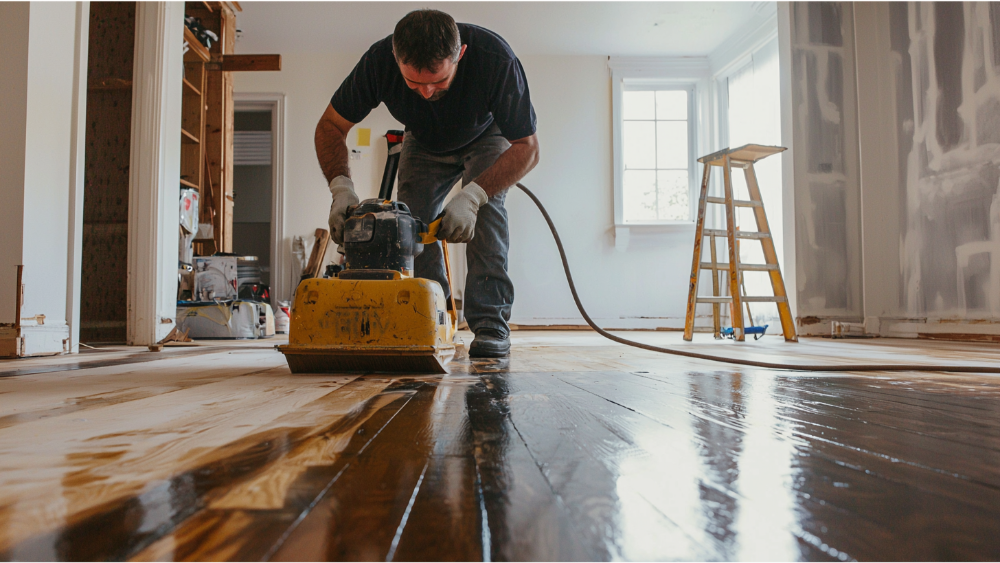
Cost Per Square Foot
The average cost of hardwood floor refinishing typically ranges from $3 to $8 per square foot. So for 1,000 square feet, you are looking at around $3,000 to $8,000. This price may vary depending on factors such as the region, the condition of your wood floors, and the complexity of the refinishing process. The cost includes sanding, staining, and applying a protective finish to rejuvenate the flooring. Larger areas may benefit from bulk pricing, while smaller spaces could potentially incur a higher per-square-foot rate due to fixed setup costs.
Labor Costs
Labor is a significant portion of the hardwood floor refinishing cost, often accounting for $2 to $5 per square foot. Skilled professionals use specialized equipment to ensure the refinishing process is completed efficiently and to high-quality standards. Costs may increase if your floors require extensive preparation, such as repairing deep scratches or damage. Hiring experienced contractors is crucial to achieving optimal results, even though it may raise overall costs.
Additional Expenses
Certain circumstances can increase the cost of hardwood floor refinishing. For instance, removing furniture, addressing subfloor issues, or working with intricate wood floor patterns could add to the expense. Homeowners might also opt for premium finishes, which can cost more per square foot but provide enhanced durability and aesthetics. Additional services like custom stains or hand-scraped textures may require more time and expertise, further impacting costs.
DIY vs. Professional Refinishing
While DIY refinishing kits are available and typically cheaper, the cost savings may not outweigh the risk of improper application. Hiring a professional ensures the hardwood refinishing process is carried out correctly, resulting in a flawless finish. Professional services also take into account safety-specific practices when handling equipment and materials. Despite a higher upfront cost, professional refinishing often proves to be more economical in the long run due to better quality and longevity.
Regional and Market Variations
The average refinishing cost per square foot can also fluctuate based on your geographic location. Urban areas with higher labor costs and a competitive market may see higher prices per square foot compared to rural areas. Local availability of materials and finishes can influence the total refinishing cost. Researching refinishing services in your area and obtaining multiple quotes can help you identify the best value for your money.
Factors That Affect Refinishing Costs
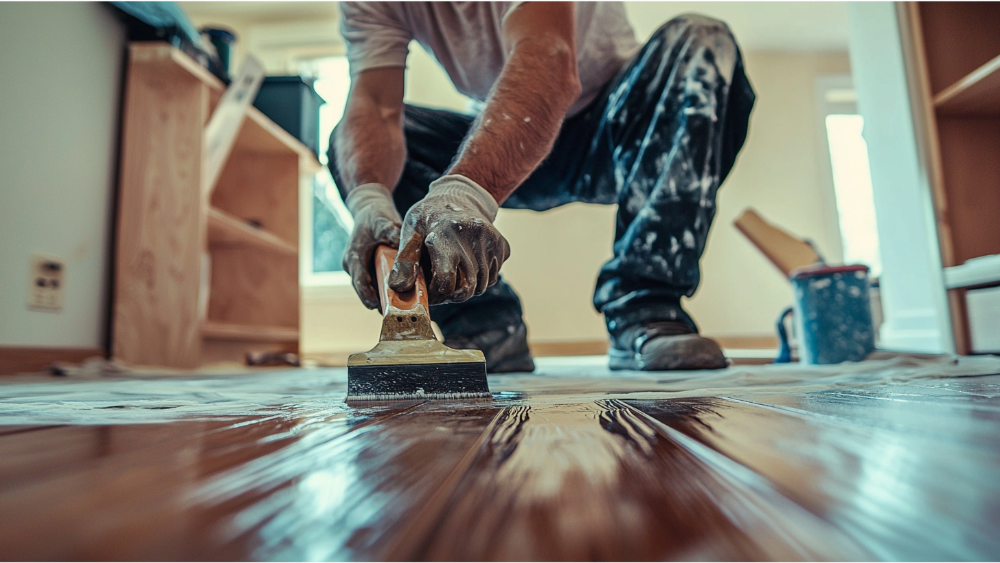
Type of Flooring
The type of flooring being refinished plays a significant role in determining costs. For instance, engineered hardwood floors often require special care during the refinishing process due to their thinner wear layer, which may limit sanding and increase complexity. Solid wood floors, on the other hand, can typically withstand sanding multiple times, making them more straightforward to refinish. Understanding the material of your wood floors helps professionals tailor the process and estimate costs effectively.
Condition of the Floors
The condition of your wood floors greatly impacts refinishing costs, as heavily damaged floors require additional labor and materials. Floors with deep scratches, stains, or warping may need repairs before the refinishing process can begin, raising overall expenses. If you’re looking to refinish hardwood stairs as part of the project, their condition will also influence the final costs due to the extra time and precision needed to address tight corners and edges. Well-maintained floors generally cost less to refinish than those requiring extensive preparation.
Complexity of the Job
Refinishing wood floors in rooms with intricate layouts or unique patterns requires more time and expertise, which increases the cost. Hardwood stairs are a prime example of complexity, involving detailed handwork and multiple surfaces to achieve a high-quality finish. Similarly, working around embedded floor features such as vents or thresholds adds to the overall difficulty. Professionals consider these challenges when providing a quote for wood floor refinishing services.
Type of Finish or Stain Chosen
The type of finish or stain you select to refinish wood floors impacts both the material costs and the labor involved in the refinishing process. High-end or custom options, such as hand-mixed stains or extra-durable coatings, may come with a higher price tag. Engineered hardwood floors may require specific finishes designed to enhance durability without compromising the material. Choosing quality finishes not only adds to the aesthetics of your wood floors but also ensures long-term protection.
Geographic Location
The cost of refinishing wood floors varies depending on your geographic location, as labor rates and material availability differ across regions. Urban areas typically have higher rates for skilled labor, including experts in refinishing hardwood stairs and floors. Additionally, rural areas might see increased costs due to limited access to specialized supplies or professionals. Securing quotes from multiple local contractors can help identify the most budget-friendly yet high-quality option in your area.
Additional Costs to Consider
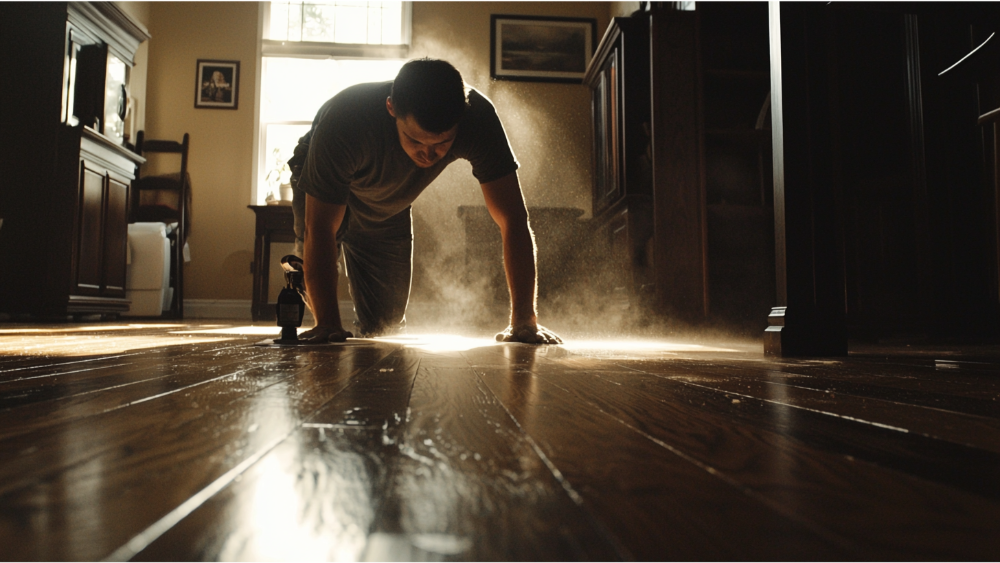
Furniture Removal and Replacement
Hardwood floor refinishers may charge extra for moving furniture out of the work area and repositioning it once the refinishing is complete. While some homeowners might handle this task themselves, professionals often provide this service for convenience, especially if heavy or fragile items are involved.
Subfloor Repairs
If your existing hardwood floors have underlying subfloor issues, fixing these will add to the overall cost. Professional hardwood floor experts may need to assess and repair sagging, squeaky, or uneven subfloors before proceeding with the refinishing process.
Custom Stains or Finishes
Opting for custom stains or premium finishes can significantly increase refinishing expenses. Hardwood floor refinishers often use higher-quality materials and spend additional time crafting and applying these finishes to ensure a polished, unique result.
Additional Coats of Finish
Some projects may require extra coats of protective finish to enhance the durability of the existing hardwood floors. Adding layers increases the material cost and labor involved, but it ensures long-lasting protection against wear and tear.
Stair Refinishing
Refinishing stairs is a meticulous and labor-intensive process compared to flat floor surfaces. Professional hardwood floor contractors may charge separately for stairs due to the detailed work required in sanding, staining, and finishing corners and edges.
Vent and Threshold Work
Addressing areas around floor vents and thresholds might incur additional costs, as these sections often require precise handwork. Hardwood floor refinishers take extra care to seamlessly blend these areas with the surrounding refinished surfaces.
Dustless Refinishing Options
For a cleaner and more convenient refinishing experience, some homeowners opt for dustless refinishing services. This option often leads to higher costs due to the specialized equipment and technology used by professional hardwood floor experts.
Frequently Asked How Much Does It Cost To Refinish Hardwood Floors Questions
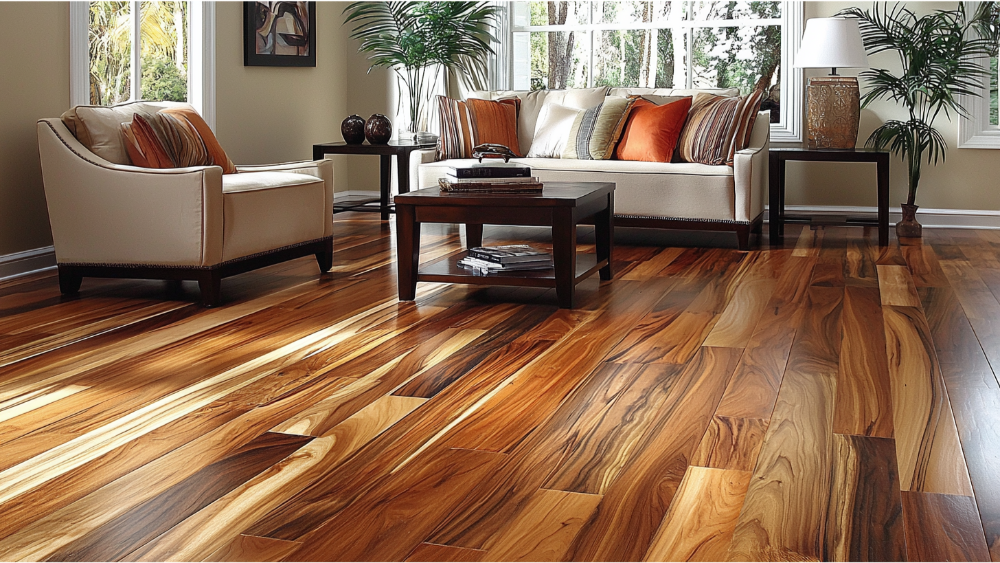
Is It Cheaper to Refinish or Replace Hardwood Floors?
Refinishing hardwood floors is almost always cheaper than replacing them, making it the preferred choice for most homeowners. The cost of refinishing typically ranges from $3 to $8 per square foot, depending on the factors outlined above, whereas replacing hardwood floors can range from $12 to $20 per square foot or more, including the cost of new materials and installation. Refinishing allows you to revive the beauty of your existing floors without the expense of purchasing and installing brand-new wood.
Refinishing is less labor-intensive and environmentally friendly, as it preserves the current materials rather than discarding them. If the floors are damaged beyond repair—such as having severe warping, rot, or structural issues—replacement may be the only viable option. Consulting a professional will help determine whether refinishing or replacing is more suitable for your specific situation and budget.
Can I Stay in My House While Floors Are Refinished?
Staying in your house during the refinishing process is possible, but it depends on the scope of the work and your tolerance for noise, odors, and disruption. Certain finishes, particularly oil-based ones, can emit strong fumes that may require temporary relocation for safety and comfort. If the refinishing is being done in stages or restricted to specific areas, you might be able to stay in other parts of the home.
Moving around could become challenging due to restricted access to refinished areas and the drying time required for the finish. Consulting with your hardwood floor refinishing professional can help you plan accordingly and decide whether staying in your home is feasible.
Does Refinishing Wood Floors Increase Home Value?
Yes, refinishing wood floors can significantly increase home value by enhancing the aesthetic appeal and overall condition of the flooring. Well-maintained hardwood floors are a sought-after feature for potential homebuyers, often contributing to a higher resale price. Refinishing old or worn floors restores their natural beauty, making the home look newer and more attractive.
It signals to buyers that the home has been well cared for, which can positively impact their purchasing decision. Investing in refinishing is an affordable upgrade that provides a high return on investment when selling your home.
Conclusion
Refinishing hardwood floors is a cost-effective and rewarding way to rejuvenate the beauty of your home while potentially increasing its market value. By understanding the factors that influence the cost, including additional services such as furniture removal, custom finishes, or dustless options, homeowners can make informed decisions that align with their budget and needs. Whether you choose to hire professionals or tackle the project yourself, refinishing is an excellent investment in preserving the charm and durability of your hardwood floors. Taking the time to plan and consult with experts can ensure a smooth process and stunning results that will last for years to come.


